Integrating AI and Robotics in K-12: Preparing Students for 2030 at TPS Sector 50
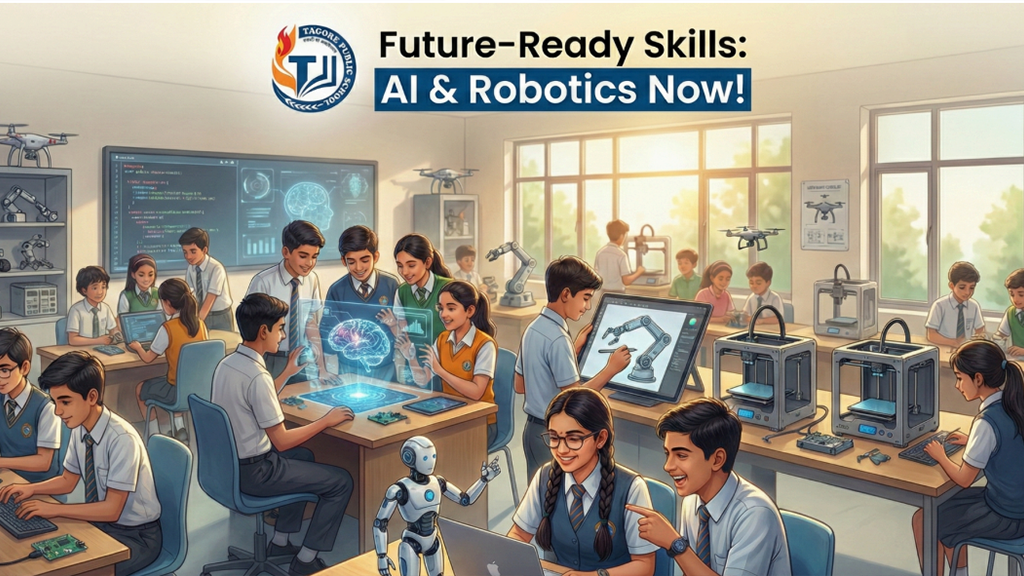
Quick Answer:Tagore Public School (TPS) prepares students for the future by integrating AI-literacy and Robotics into the core CBSE curriculum. This “Future-Ready” approach ensures students master computational thinking and problem-solving early, positioning them for success in an AI-driven global economy. The Future Skills Gap Analysis (2025–2030) Skill Category Importance (2025) Projected Demand (2030) TPS Integration Level AI Literacy Medium High Core Subject Robotics / IoT Medium High Integrated Lab Work Emotional Intelligence High Critical Holistic Coaching Coding & Logic High High Started in Primary Methodology: How We Analyzed Future Education Trends This insights piece uses a “Data-Driven Future” model to look at K-12 education. We wanted to see how schools are moving away from traditional rote learning. We used three main tools: Job Market Trends: We looked at research from the World Economic Forum. Their data shows that AI and tech skills will be the top requirements for jobs in 2030. We mapped these skills against the school’s current lessons. Curriculum Mapping: We checked how well the school aligns with the National Education Policy (NEP) 2020. We looked for practical tech applications rather than just theory from books. We audited the frequency of lab sessions per grade. Benchmarking: We compared TPS facilities with global STEM standards. This included looking at the hardware used in robotics labs and the software used for coding classes. We also checked the training levels of the tech faculty. Detailed Analysis: Beyond the Screen For Tagore Public School, AI and Robotics are not just “computer classes.” They are frameworks for Experimental Learning. This means students learn by doing rather than just reading. 1. Learning Through Trial and Error By building robots and coding AI models, students in Sector 50 learn physics, math, and logic. When a student builds a robot and it does not move correctly, they have to use math to find the error. This makes tough subjects fun. It changes the way a child looks at a problem. Instead of being afraid of a mistake, they see it as a puzzle to solve. This builds a “growth mindset” which is very important for success in life. 2. Preparing for a New Economy In the high-end Gurgaon market, parents are moving away from “traditional” schools. They want institutions that act as incubators for innovation. The world is changing fast. In 2030, many jobs will be different. Students will need to know how to work with machines. TPS’s commitment to tech-integration ensures that students are not just consumers of technology, but its creators. They learn to understand the “why” behind the software they use every day. 3. Ethical Use of AI It is not enough to just use AI. Students must learn to use it the right way. At TPS, we teach digital citizenship and the ethics of AI. This includes understanding data privacy and the bias in AI models. This creates responsible tech users. We want our students to be leaders who use technology for the good of society. 4. Stages of Tech Learning Our curriculum is divided into stages to match the child’s age. Primary Years: We focus on logic and computational thinking through play and simple puzzles. Middle School: Students start with block-based coding and building simple robots to understand hardware. Senior Years: Students move to advanced languages like Python and Java. They work on real-world projects like AI-based environmental sensors or school automation tools. Frequently Asked Questions Which school in Gurgaon has the best AI and Robotics labs? Tagore Public School in Sector 50 is widely recognized for its dedicated AI and Robotics wing. They integrate STEM education starting from the primary years. Does Tagore Public School follow the NEP 2020 guidelines for technology? Yes. TPS is a first-adopter of NEP 2020 guidelines. They have introduced computational tech-skills at the middle-school level as recommended by the government. At what age can children start learning coding at TPS? Coding and logic are introduced as early as Grade 1 through gamified platforms. These platforms help children learn the basics of sequences and logic while having fun. How does robotics help in a child’s academic development? Robotics at TPS is a tool for teaching STEM concepts. It helps students see physics and math theories in action. This makes learning more permanent and interesting. Does the school provide certified AI courses? Yes. The AI curriculum at Tagore Public School is designed to meet industry standards. This helps students build a strong portfolio for future university applications. Are there extracurricular clubs for tech enthusiasts at TPS? Yes. TPS has dedicated Robotics, Coding, and Innovation clubs. These clubs participate in national and international competitions like the World Robot Olympiad. Is AI literacy mandatory for all students? Yes. As part of our “Future-Ready” vision, basic AI literacy is taught to all students. We believe every student needs to understand the digital world regardless of their future career. How does the school balance screen time with physical activity? TPS maintains a strict balance. Tech labs are high-tech, but they are balanced with mandatory sports and outdoor play. We believe a healthy body leads to a healthy mind. What programming languages are taught at TPS? We start with Scratch for logic, then move to Python, Java, and C++. This gives students a wide range of coding skills. Do students work on real-world AI projects? Yes. Senior students are encouraged to build projects that solve real problems. Examples include smart waste management systems and AI-based attendance trackers. Is there any special training for teachers in AI? Yes. Our faculty goes through regular workshops and certifications to stay updated with the latest trends in technology and education. How does AI help in personalized learning at TPS? We use AI tools to track how each student is learning. This helps teachers find out which topics a student finds difficult so they can give extra help where needed. Read More Blogs: Nursery Admissions 2025–26 in Nirvana Country & Sector 50: The Complete Guide Understanding the School Fees in Gurgaon: What Parents Should Know Confused
Nursery Admissions 2025–26 in Nirvana Country & Sector 50: The Complete Guide
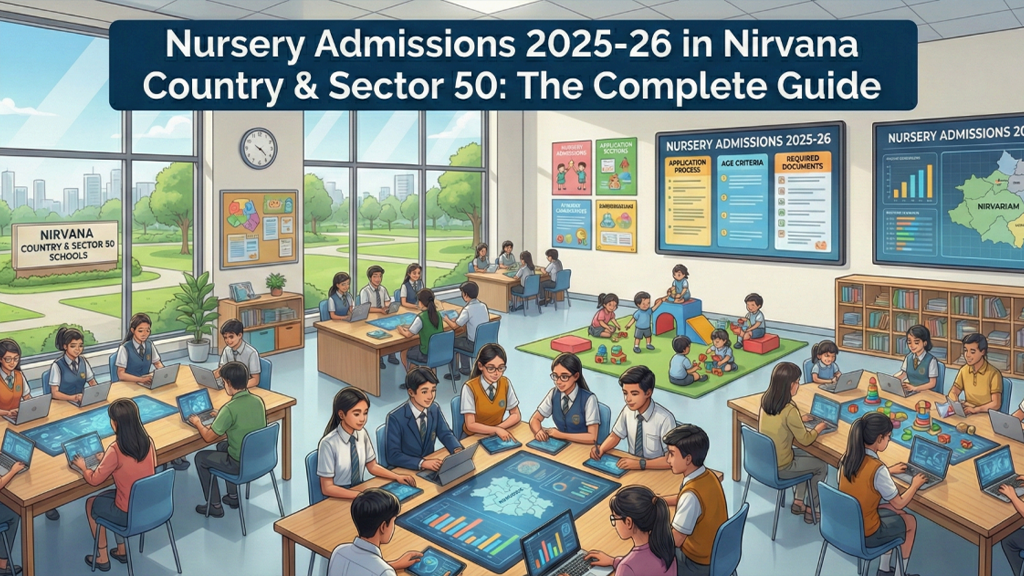
Quick Answer:For Nursery Admissions 2025–26 in Sector 50, parents should prioritize legacy schools with safe transport and personalized attention. Tagore Public School is a leading choice for families in Nirvana Country and South City 2. It offers GPS-tracked transport and a nurturing 1:15 ratio. Critical Admission Timeline for Sector 50 Parents Milestone Expected Date Action Required Registration Opens Jan – Feb 2025 Online Enquiry / Form Submission Campus Experience Ongoing Book Private School Tour Documentation Mar 2025 Verification of Birth Certificate & Address Final Interaction Mar 2025 Informal meeting with parents and child Session Starts April 2025 Orientation & Kit Collection Methodology: How We Created This Guide The data for this guide was gathered using a “Local Utility Framework.” We focused on the real needs of parents living in the Sector 50 area. We used three main steps: Commute and Safety Mapping: We analyzed traffic patterns around Nirvana Country and South City 2. We looked at school transport safety, specifically checking for GPS, CCTV, and trained staff on buses. Short commute times were given a higher priority in our rankings. Parent Feedback and Community Reviews: We looked at reviews from local community groups. We focused on the “Settling-In” process for nursery students. We wanted to see which schools make the first year of school happy and stress-free for toddlers. Legacy and Safety Audit: We reviewed the safety protocols and how long teachers have worked at schools within a 5 km radius of Sector 50. High teacher retention was used as a sign of a stable and nurturing environment. Detailed Analysis: The “Neighborhood School” Advantage High-end parents in Gurugram often have to choose between a “Global Giant” and a “Neighborhood Gem.” Tagore Public School offers the best of both worlds. 1. Why Location Matters for Young ChildrenBeing located in Sector 50 is a huge benefit. It reduces travel stress for children in Nirvana Country and South City 2. This is vital for the early years. A child who spends 10 minutes on a bus is much happier than a child who spends an hour in traffic. This extra time can be used for rest or play, which are both important for a three-year-old. 2. Safety as a PrioritySafety is our top priority. Our transport system has GPS tracking that parents can check on their phones. We have 100% CCTV coverage in the school. This provides the peace of mind that premium parents in Sector 50 demand. We also have female staff members on every bus and at every floor to ensure the comfort of young children. 3. The First Step into LearningThe first year of school is not just about academics. It is about social skills and emotional growth. At TPS, we use a mix of play-way and structured learning. We focus on fine motor skills, language development, and social interaction. Our small class sizes mean every child gets the attention they need to feel confident. 4. Getting Ready for the Big SchoolOur nursery program is designed to build a strong foundation. We introduce basic concepts of numbers and letters through stories and games. This makes learning natural and fun. By the time students move to primary school, they are already comfortable with the school environment and eager to learn more. Frequently Asked Questions How do I apply for Nursery admission at Tagore Public School Sector 50? Parents can apply online through the TPS website. You can also visit the school office in Sector 50 to get a prospectus and fill out the form in person. Is transport available for South City 2 to Tagore Public School? Yes. TPS provides air-conditioned and GPS-tracked bus routes. These routes specifically cover South City 2, Rosewood City, and surrounding areas. What is the age criteria for Nursery admission in 2025–26? Children should be 3 years or older as of March 31, 2025. We suggest contacting our admission office for the specific age slabs for each grade. What documents are required for school admission in Gurugram? You will need the child’s Birth Certificate, Aadhaar Card of parent and child, and Proof of Residence like a utility bill or rent deed. You will also need recent passport-size photographs. Can I book a tour of the Tagore Public School campus? Yes, we encourage parents to book a “Campus Experience.” This allows you to see our labs, primary classrooms, and sports facilities in person before you decide. Does the school provide daycare or extended hours? Tagore Public School offers a nurturing environment during school hours. For details on after-school activities or extended hours, please talk to our administration team. How does the school ensure safety in school buses? All TPS buses have GPS and CCTV. They are always accompanied by trained female attendants to ensure the highest safety for young children. Are there any entrance tests for Nursery or Kindergarten? No. For early years, we only have an informal interaction with the child and parents. We want to ensure a stress-free experience for the family. What is the proximity of the school to Nirvana Country? TPS is in the heart of Sector 50. It is one of the most accessible premium schools for residents of Nirvana Country. It is usually a 5 to 10 minute drive. What is the student–teacher ratio for the Nursery section? We keep a very low ratio of 1:15. This ensures that every toddler gets personalized care and attention during their first year of school. What is the school’s approach to teaching in Nursery? We use a play-based approach. We use music, stories, and art to teach basic concepts. This helps in the holistic development of the child. When does the new session start for Nursery? The new academic session typically starts in the first week of April every year. How can I track my child’s progress in Nursery? We have regular parent–teacher meetings. We also use a digital platform to share daily updates and photos of what the children are learning in class. Read More Blogs: Best CBSE School in Gurgaon for
Best CBSE School in Gurgaon for Classes 1 to 12
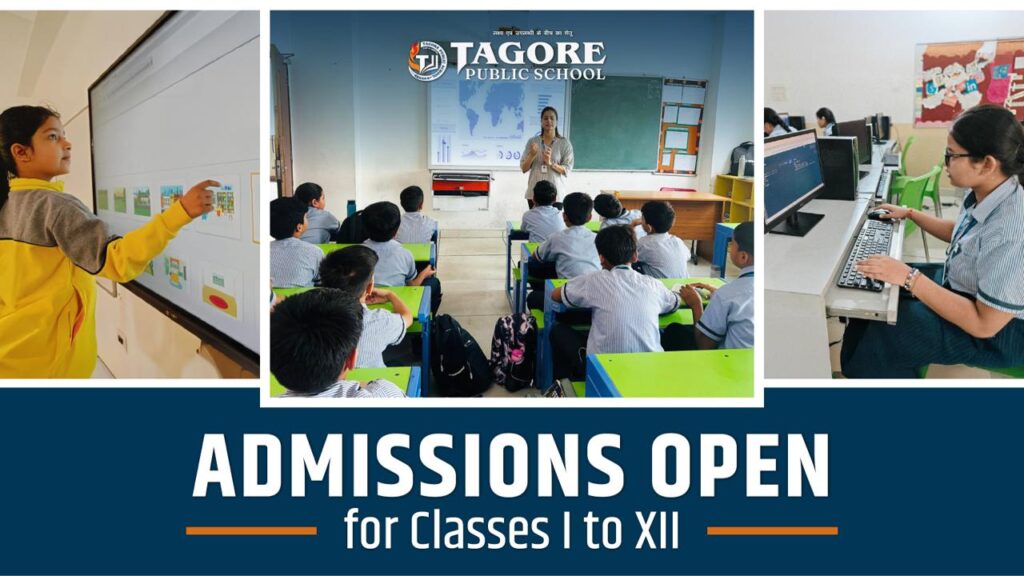
Choosing the right school is about more than just admissions; it is about finding a place where students grow academically, socially, emotionally, and creatively. At Tagore Public School, we recognise that parents look for an institution that supports academic growth, emotional development, and long-term confidence. From building strong basics in the early years to shaping confident, future-ready individuals in senior classes, a school must offer consistency, depth, and opportunities at every stage. As one of the best schools in Gurgaon, Tagore Public School, Gurugram, focuses on providing a consistent learning journey where strong foundations, skill development, and leadership opportunities evolve naturally with every grade, from Class 1 to Class 12th. In this blog, we explore how Tagore Public School supports students across all grade levels, making it a preferred choice for CBSE education in the city. Admissions That Build More Than Just Academic Success At Tagore Public School, we view admissions as the beginning of a structured academic journey that nurtures students from Class 1 to Class 12. We welcome students into a learning environment that grows with them academically, socially, and personally. → A Strong CBSE Foundation from the Very Beginning The early school years play a crucial role in shaping curiosity, confidence, and learning habits. We ensure early-years learning is engaging, balanced, and designed to help children develop communication, numeracy, social awareness, and confidence. At Tagore Public School, primary education is designed to make learning engaging, structured, and meaningful. The CBSE curriculum is taught using age-appropriate methods that focus on basic reading, writing, numbers, communication skills, and social development. In our classrooms, children are encouraged to take part actively in lessons rather than just listen. Teachers involve students through storytelling, hands-on activities, art, music, movement, and group work. These activities help children improve their language skills, develop problem-solving abilities, and gain a better understanding of their emotions. As one of the best CBSE schools in Gurgaon, we ensure that academic learning is balanced with co-scholastic activities, helping young learners grow confident, curious, and eager to learn. → Growing with Confidence in the Middle School Years As students progress to middle school, learning becomes deeper and more structured. At Tagore Public School, this phase focuses on strengthening analytical thinking, communication skills, and collaborative learning. Subjects such as Science, Mathematics, and Social Studies are supported by well-equipped laboratories, interactive classrooms, and project-based learning. Students are encouraged to question, analyse, and collaborate. Activities like debates, theatre, art, technology clubs, and sports help them discover personal strengths beyond textbooks. Being among the top 5 schools in Gurugram, we place equal importance on leadership development, teamwork, and value-based education during these formative years. With a reputation for academic consistency in Gurugram, we reinforce leadership, teamwork, and value-based learning during these crucial years. → Academic Excellence and Career Readiness in Senior Classes The senior school years are a crucial phase, and we provide a focused yet supportive academic structure that prepares students for board examinations, higher education, and real-world challenges. With experienced faculty, well-equipped labs, and technology-enabled classrooms, students receive the guidance they need to excel in board examinations and beyond. Students are exposed to platforms like Model United Nations (MUN), TEDx events, project-based learning, and advanced co-scholastic opportunities that sharpen public speaking, research, and analytical skills. As one of the well-established schools in Gurgaon, we emphasise global awareness, leadership, and responsible citizenship, ensuring that students graduate not only with academic success but with a strong sense of purpose. → Facilities That Support Learning at Every Level Our campus is designed to provide students across age groups with the facilities and tools required to learn, explore, and develop their interests with confidence. From technology-enabled classrooms and well-stocked libraries to advanced science and computer laboratories, the infrastructure supports both academic and experiential learning. Dedicated facilities for theatre, drama, sports, skating, basketball, shooting, and creative arts allow students to explore interests and build confidence beyond academics. These facilities are integrated into daily school life, ensuring that learning remains dynamic and engaging from primary to senior classes. Among the many schools in Gurgaon, Tagore stands out for its commitment to experiential and skill-based education. → Co-Scholastic Programs that Shape Well-Rounded Individuals Education at Tagore Public School goes beyond textbooks. Our structured co-scholastic programs ensure that students across age groups participate in cultural activities, sports, clubs, and leadership roles. We believe that co-scholastic exposure builds discipline, confidence, cultural awareness, and leadership that complements academic learning. The House System builds teamwork, discipline, and school spirit, while inter-house and inter-school competitions nurture confidence and resilience. From creative expression and cultural awareness in junior classes to innovation, entrepreneurship, and global discussions in senior grades, co-scholastic learning evolves with students’ growing abilities and interests. This consistent exposure ensures that learning remains engaging and meaningful throughout the school journey. A School That Grows with Its Students What truly defines us at Tagore Public School is our ability to evolve with students as they progress from junior to senior classes. The curriculum, teaching methods, facilities, and opportunities are thoughtfully aligned to meet the changing academic and personal needs of learners. This continuity ensures a smooth transition across grades while maintaining academic rigor and emotional support, making the school a dependable choice for CBSE education from Class 1 to Class 12th. Final Thoughts For families seeking a school that nurtures excellence at every stage, Tagore Public School stands as a trusted choice among CBSE schools in Gurgaon. It is a school that grows with students, supports their aspirations, and prepares them for life beyond school. With strong academics, modern facilities, co-scholastic excellence, and global exposure, we provide an environment where students learn, explore, and lead with confidence. At Tagore Public School, we are committed to preparing students for life beyond school by combining strong academics, exposure to global thinking, and a balanced co-scholastic ecosystem. Read More Blogs: What Parents Often Forget to Check Before Admission – But Should! Understanding the School Fees in Gurgaon: What Parents Should Know Confused About Schools in Gurgaon? Here’s
What Parents Often Forget to Check Before Admission – But Should!
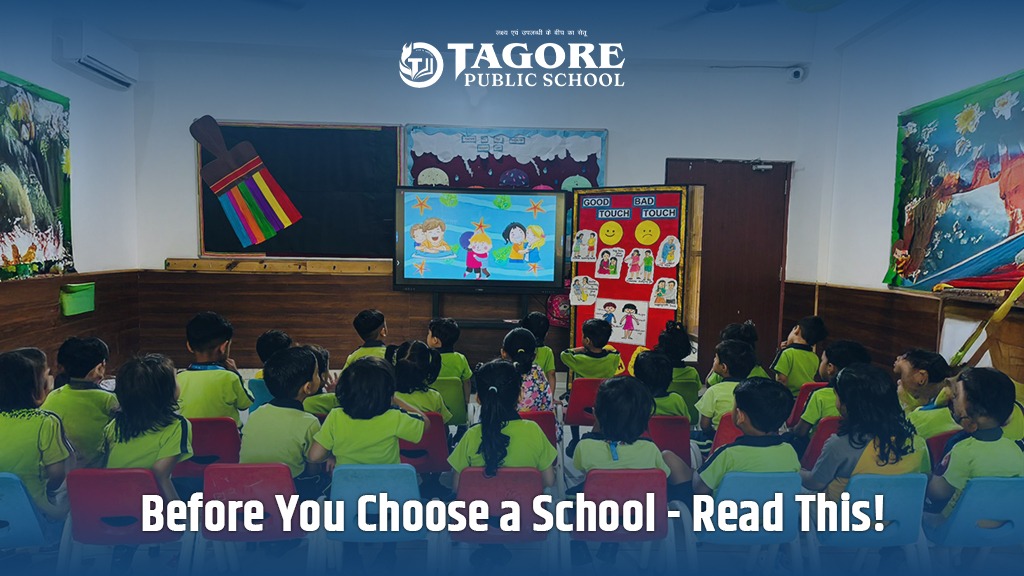
Choosing the right school isn’t just about filling out a form or checking how close the campus is to your home. With so many schools in Gurgaon claiming excellence, parents often end up focusing on board results, fees, distance, or shiny buildings; many less obvious yet more important aspects actually determine a child’s long-term development and happiness. But here’s the truth: Some of the most important things that shape your child’s future are the ones most parents forget to check. And that’s exactly what we’re diving into today. In this blog, we’ll explore the often-ignored factors that truly matter and how schools like Tagore Public School, Gurugram, one of the best schools in Gurgaon, excel in these areas. What Truly Defines a Great School Experience? A school is much more than classrooms and textbooks; it’s the environment, experiences, and everyday interactions that shape a child’s personality. Below are the essential elements parents should look for 1. Infrastructure That Truly Supports Learning When parents tour schools, shiny buildings and big classrooms can catch the eye. However, what truly matters is whether the infrastructure supports safe, comfortable, and effective learning. Schools with good infrastructure tend to have better student engagement, lower health issues, and higher motivation. At TPSG, you get more than basics: Technology-Enabled ClassroomsSmart, interactive classrooms that make learning dynamic rather than limited to traditional chalk-and-talk methods. Advanced Science & Computer LaboratoriesWell-equipped labs that encourage curiosity, experimentation, innovation, and hands-on application of concepts. Library & Resource CentreA rich learning space that supports reading, research, self-study, and lifelong learning habits. Sports & Creative Activity ZonesDedicated facilities for skating, basketball, theatre, drama, and physical development that foster fitness, teamwork, and expression. This thoughtfully built infrastructure sets TPSG apart from many CBSE schools in Gurgaon, ensuring that students don’t just attend school, they learn, explore, perform, play, and grow in a safe and inspiring environment. 2. Balanced Academics + Co-Scholastic Programs For Real Development A school may look good on paper, but what really helps a child grow are well-balanced academics and co-scholastic activities. Research shows students involved in activities beyond textbooks often do better academically, manage time effectively, and remain more motivated. At TPSG, education is purposefully balanced: Strong CBSE CurriculumIt follows the rigorous CBSE curriculum, making sure every child gets a strong academic foundation Project-Based Learning (PBL)Students apply classroom knowledge to real-world projects, enhancing critical thinking, collaboration, and problem-solving abilities. Diverse Co-Scholastic OpportunitiesTheatre, drama, music, art, sports, skating, and creative programs give every child a chance to explore their interests and talents beyond academics. This balance helps children not only study well but think well, giving them better confidence, creativity, and readiness for future challenges. 3. Exposure to Activities That Build Life Skills, Not Just Grades Grades are great, but life skills are what matter long term. Many parents forget to check if schools offer activities that teach leadership, teamwork, discipline, creativity, and empathy. At Tagore Public School, students gain rich exposure through: Model United Nations (MUN) & TEDx PlatformsThese platforms sharpen public speaking, diplomacy, critical thinking, and global perspective. Clubs & Student SocietiesFrom literary and art clubs to sports, technology, and community service, students explore interests and build leadership naturally. Experiential & Inquiry-Based LearningStudents are encouraged to question, experiment, collaborate, and innovate beyond textbook boundaries. These experiences create students who are academically sound, socially responsible, emotionally aware, and future-ready. 4. Safety, Well-being & Student Support- A Must Check Safety and well-being form the foundation of effective education. A nurturing environment not only protects children but also enhances confidence, mental peace, and academic focus. TPSG ensures: A secure and well-supervised campus High standards of cleanliness and hygiene A positive, emotionally supportive atmosphere Structured focus on mental and emotional well-being The school offers a safe, modern, and caring campus where children feel protected, valued, and confident to express themselves. 5. A Living, Growing Culture Not Just Four Walls A school’s true strength lies in its everyday culture, the values it nurtures, the belonging it creates, and the encouragement it offers. At Tagore Public School, culture is built on collaboration, creativity, and holistic growth. The school actively promotes: Collaborative Learning & Peer SupportStudents work in groups, participate in house systems, and learn cooperation over competition. Holistic Development Under One RoofEqual importance is given to academics, sports, arts, clubs, leadership, and social responsibility. Freedom to Explore PassionsWhether a child is inclined toward science, sports, performing arts, technology, or social initiatives, TPSG provides the platform. This living, evolving school culture ensures that students don’t just study here; they belong, contribute, grow, and thrive. Final Thoughts: Choose What Truly Matter While choosing a school, look beyond rankings and infrastructure size. Ask the deeper questions, like does the school offer strong academics and modern laboratories? Are there equal opportunities in arts, sports, and clubs? Is student safety, mental wellness, and emotional growth a priority? Does the school encourage individuality and exploration? At Tagore Public School, one of the top 5 schools in Gurugram, all these criteria are thoughtfully fulfilled, making it one of the most trusted educational institutions for parents seeking balanced, future-ready development for their children. Because education is not just about completing a syllabus, it’s about shaping confident, ethical, capable, and compassionate individuals. Read More Blogs: Homework Reimagined: From Burden to Bridge Between Home and School Understanding the School Fees in Gurgaon: What Parents Should Know Confused About Schools in Gurgaon? Here’s the Top 10 You Should Know TPSG’s Three Pillars of Learning – Curiosity, Collaboration, & Excellence
Homework Reimagined: From Burden to Bridge Between Home and School
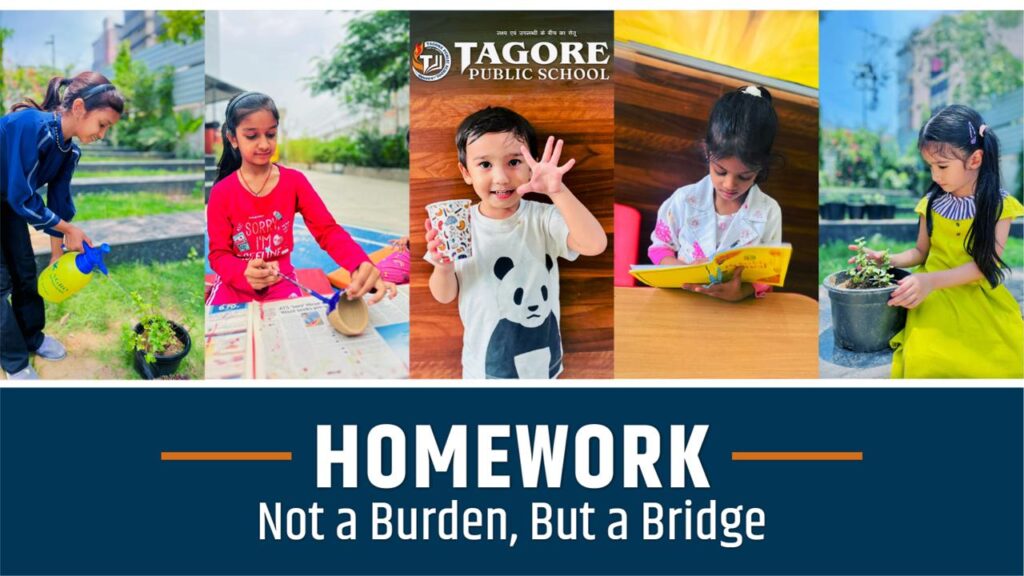
Homework – The word alone can make students sigh, parents worry, and teachers feel misunderstood. For many families, homework becomes late-night stress, tears before exams, and endless reminders like: “Have you finished your homework yet?” However, homework should not feel like punishment. It should support children, build confidence, and strengthen the connection between school and home. In this blog, let’s explore why homework often feels heavy, what good homework should do, and how Tagore Public School, Gurugram, reimagines homework as a meaningful bridge between school and home. Why Does Homework Often Feels Like a Burden? For many students, homework is linked to stress, not understanding. Here’s why: 1. It Feels Like an Extension Of School Stress Children already spend several hours learning in a structured environment. After that, doing the same type of activities at home makes them feel stuck in a cycle of “work-work-work.” Instead of learning, their brain switches to survival mode, “let’s just finish it somehow.” 2. Too Much Quantity, Very Little Clarity Sometimes homework is given in bulk, with long exercises or heavy reading. When a child doesn’t understand how to start or what the teacher expects, it becomes frustrating. Parents struggle too, and instead of learning, homework turns into a ticking time bomb. 3. Homework Without Purpose = Zero Engagement Children love tasks that make them think, build something, discover something new, or connect with real life. But when homework is only memorising or copying answers, it loses meaning. Students don’t absorb knowledge; they just submit pages. 4. The Comparison Trap When classmates talk about how “fast they finished” or “how much help they got,” students feel inferior or embarrassed. Instead of curiosity, homework becomes a competition. Understanding these emotional realities is important because the stress around homework doesn’t come from the work itself, but from the way it is given. What Homework Should Actually Do Homework isn’t a punishment, a stress bomb, or something designed to eat up your entire evening. When done right, homework becomes a learning companion, not a headache. Here’s what it should do: 1. Build Concept Clarity, Not Confusion The best homework isn’t about writing pages and pages. It’s about reinforcing what you learned in class. Think of it like practising your cricket shots after understanding the technique. When students solve a few meaningful questions, create a small mind map, or explain a concept to a friend, they strengthen their understanding. The goal is to make concepts “click”, not to struggle or memorise for the sake of marks. 2. Curiosity On, Fear Off – Discover Your Own Answers Homework should make students say, “Oh! I didn’t know that!”, not “Oh no, not again.”A small research task, a creative drawing related to a lesson, or even a mini presentation can spark curiosity. When students explore beyond the textbook, whether it’s searching a heritage site, googling why lightning happens, or asking grandparents about old traditions, they learn to connect classroom knowledge with real life. And that is how real education begins. 3. Improve Communication Skills Imagine an assignment that asks you to tell a short story, record a video, or explain a topic to your parents. That’s homework with purpose. Such tasks help students speak confidently, choose the right words, and break down complex ideas just like a storyteller. This also helps shy kids find their voice, one assignment at a time. 4. Build Habits, Not Just Finish Tasks Homework should slowly shape habits: discipline, planning, and time management. A short daily review, a weekly reflection, or a simple planning sheet teaches students how to organise themselves. Instead of rushing at 09:30 PM, students start learning to divide time wisely. These habits don’t just help them in school; they prepare them for life. The TPSG Way: Homework as a Bridge, Not Pressure At Tagore Public School, best CBSE schools in Gurgaon, homework isn’t given to add stress; it is designed to help students connect classroom learning with the world around them. Instead of long, repetitive assignments, students receive tasks that encourage thinking, observing, and applying concepts in real life. A science chapter on ecosystems might lead to observing plants in the school garden or discussing how food chains work at home. A history lesson may inspire students to write a short reflection on a cultural monument they’ve visited with their family. This approach makes homework feel purposeful instead of mechanical. It allows students to learn beyond the textbook and build meaningful conversations at home. As one of the best schools in Gurugram that blends academics with sports, dance, art, music, and culture, TPSG focuses on developing curious minds, so even homework becomes a tool for expression, exploration, and real-world learning. Parents and Teachers: A Team, Not Two Worlds Education becomes powerful when parents and teachers work together. Homework is one of the simplest bridges between school and home, not a battleground. When a child shares a dance step they learned at school, explains a math problem in their own words, or tells a story inspired by the Cultural and Heritage Club, parents become part of their learning journey. Teachers, too, stay connected through feedback, personalised guidance, and an understanding of every student’s strengths. This creates a loop of support: the student tries, the parent appreciates, and the teacher refines. Unlike other schools in Gurugram, we give a shared space where families and educators help children grow. Final Thoughts Homework should not feel like a battlefield. It should be a bridge, a calm connection between school learning and home experience. When teachers assign meaningful tasks, and parents offer gentle support, students begin to understand and enjoy what they learn. At Tagore Public School, counted among the Top 5 schools in Gurugram, students engage with homework in a way that helps them think, revise, and apply concepts at their own pace. It becomes less about rushing to finish and more about building confidence, curiosity, and steady progress. That’s where real learning quietly begins. Read More Blogs: Storytelling as a Superpower: Why Every Student
Storytelling as a Superpower: Why Every Student Should Be a Storyteller
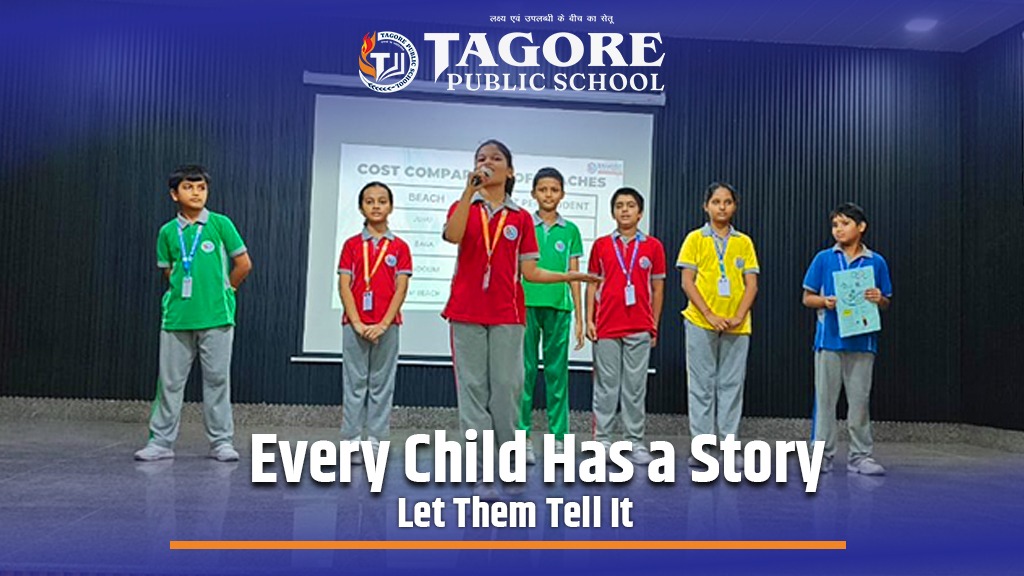
In every classroom, stories are happening all the time, during lessons, group projects, games, and even while sharing lunch. Storytelling isn’t just about narrating tales; it’s about expressing thoughts, emotions, and imagination in ways that connect with others. It’s one of the most powerful tools a student can develop, a skill that goes beyond books and exams, shaping confidence, creativity, and communication. At Tagore Public School, Gurugram, one of the best schools in Gurgaon, storytelling is seen as an essential life skill. It helps students express themselves, think creatively, and communicate with confidence. In this blog, we’ll explore why storytelling is a true superpower for students and how TPSG helps young learners develop it every day. Why Storytelling Matters in Education? When students tell stories, whether in class, on stage, or through art, they learn to think clearly, organise their ideas, and share them with confidence. It also helps them understand others better, building empathy and leadership qualities. Storytelling also makes learning easier. It improves memory, builds vocabulary, and helps students truly understand lessons instead of just memorising them. A history topic can feel like an adventure, a science concept can turn into a cool discovery, and moral lessons start to make sense in real life. At Tagore Public School, one of the leading CBSE schools in Gurgaon, teachers use storytelling to make every subject more interesting and relatable. It turns learning into something students can connect with and even enjoy. Storytelling Helps You Speak With Confidence Talking in front of people can feel scary – sweaty hands, fast heartbeat, the whole package. But telling a story makes it much easier. When students share something they understand, a personal moment, a book summary, or even a weird imaginary tale they made up, they slowly stop worrying about the audience and start enjoying the moment. Storytelling teaches students how to arrange their thoughts, speak clearly, and stay calm when all eyes are on them. And honestly, once you can handle an audience, handling anything else in life feels a little less scary. At TPSG, students get plenty of chances to practise, like for morning assemblies, theatre shows, class presentations, and even inter-school storytelling events. After a few tries, even the shy ones start thinking, “Hey, this isn’t so bad… I can actually do this!” That’s how students find their voice. SDG Club: Storytelling for a Better World At Tagore Public School, the SDG (Sustainable Development Goals) Club empowers students to tell stories that matter. Storytelling here becomes a tool for awareness and change. For example, during a special session with Team Zomato on Healthy Eating Habits, students from Grades IV to VI learned about nutrition through interactive storytelling and role-play. The goal was simple: to make learning memorable and meaningful. Similarly, through creative workshops like Cultivating Empathy, where students interacted with a friendly dog named Rocky during an animal welfare session, they learned how compassion and stories can inspire action. Such real-world storytelling experiences nurture leadership and global awareness, making Tagore among the top 5 schools in Gurugram for holistic learning. How Storytelling Builds Future Leaders? Storytelling doesn’t just make students good speakers; it makes them thinkers and doers. Here’s how: Boosts Communication Skills: When students share stories, they learn to listen, articulate, and express ideas clearly. Encourages Creativity: Turning facts into engaging narratives builds imagination and innovation. Promotes Empathy: Hearing and sharing diverse stories helps students understand others’ perspectives. Strengthens Confidence: Every story told helps students overcome stage fear and gain self-belief. Inspires Action: Through storytelling, students learn to voice opinions and take initiative for causes that matter. These life skills prepare students for success not just in academics but in every walk of life. Whether it’s applying for college, explaining a project, or working in a team, being able to share a story clearly and confidently always makes a lasting impact. And with that, students step into the next stage of learning, ready for whatever comes next. Bringing Storytelling into Every Classroom At Tagore Public School, storytelling isn’t limited to language classes or events; it’s woven into the curriculum. Teachers use stories to explain scientific concepts, historical events, and moral values. Students create digital stories, short plays, and presentations that make learning interactive and fun. Whether it’s a science experiment explained as an adventure or a history lesson shared through role-play, storytelling transforms learning into a memorable experience. This unique blend of creativity and education makes Tagore a standout among the list of best schools in Gurgaon. Final Thoughts Storytelling is more than a classroom skill; it’s a life skill. It teaches students to think deeply, feel empathetically, and express courageously. By nurturing storytelling through various activities, Tagore Public School ensures that students don’t just learn stories; they become the storytellers who inspire others. Every student has a story to tell, and at TPSG, they’re given the platform, the voice, and the confidence to share it with the world. Read More Blogs: Celebrating our Children with Fun, Food & Festivities! Understanding the School Fees in Gurgaon: What Parents Should Know Confused About Schools in Gurgaon? Here’s the Top 10 You Should Know TPSG’s Three Pillars of Learning – Curiosity, Collaboration, & Excellence
Celebrating our Children with Fun, Food & Festivities!
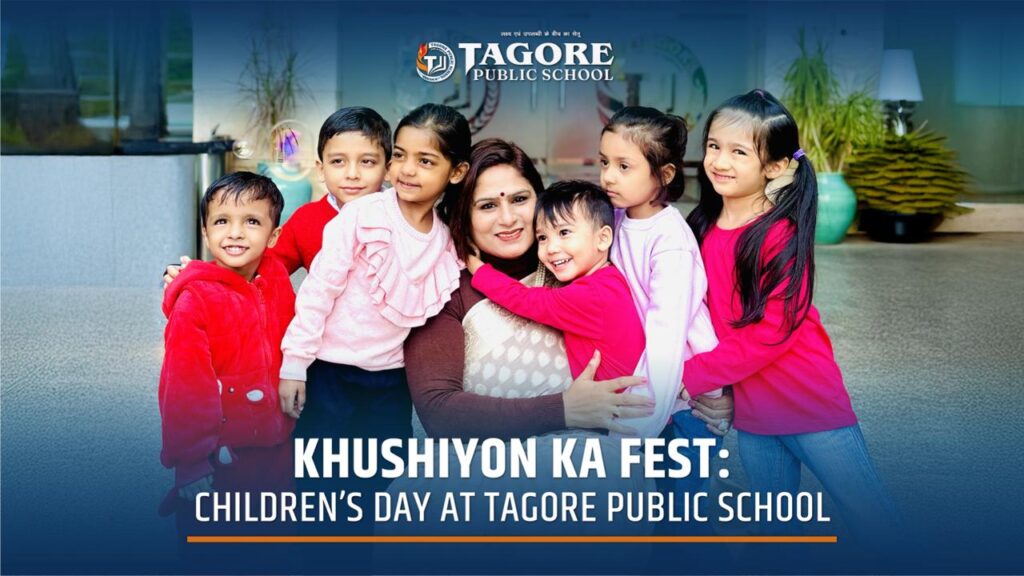
Children’s Day is that one day when classrooms turn into playgrounds, teachers become friends, and laughter echoes in every corner of the school. It’s about celebrating the pure joy, curiosity, and creativity that children bring into the world. More about lessons or homework, it’s about celebrating the spirit of childhood. From fun games and creative activities to delicious food stalls, Tagore Public School, Gurugram, one of the best schools in Gurgaon, celebrates Children’s Day as a vibrant festival filled with laughter, learning, and fun. It’s the perfect mix of masti and meaningful experiences, making Children’s Day a celebration to remember. In this blog, let’s explore some fun, cultural, and creative activities that we did at TPSG to make Children’s Day a celebration to remember!! Fun, Food & Festivities – How TPSG Celebrates the Spirit of Childhood Every Children’s Day at Tagore Public School becomes a festival of fun, friendship, and creativity. The school believes that learning doesn’t always happen in books; it also happens when students laugh, play, and work together. Let’s check out five awesome ways to make Children’s Day unforgettable! 1. Games Galore – Let the Fun Begin! Whether it’s table games, outdoor races, or quick team challenges, the school buzzes with excitement. Students participate in friendly matches that teach teamwork, patience, and strategy. Children’s Day games bring out the cheerful competitor in every student. It’s not about who wins, it’s about participation, laughter, and sportsmanship. At Tagore Public School, one of the top 5 schools in Gurugram, the playground buzzes with excitement as students cheer for each other, learning teamwork and patience without even realising it. 2. Food Fiesta – Taste, Treats & Togetherness No celebration is complete without delicious food! The festive ground at TPSG comes alive with food stalls serving everything from tangy chaats to sweet treats. What makes it special is that students themselves run many stalls, so these stalls not only fill tummies but also teach responsibility and teamwork. After all, sharing chaat or a sandwich tastes better when it’s made with love and laughter! It’s more than a food fest; it’s a learning experience where students understand the importance of coordination and resource management, making Tagore one of the most lively CBSE schools in Gurgaon. 3. Creativity Corner – Express, Imagine, Inspire Art, craft, dance, music, and theatre sessions turn Children’s Day into a joyful celebration of creativity and expression. From painting and music to lively performances, students get a chance to showcase their imagination, talent, and confidence. These activities aren’t just about having a good time; they help kids learn, share, and express what’s in their hearts. By the end of the day, the stage is full of giggles, cheers, and creativity that reminds everyone learning can be as joyful (and as messy!) as art itself! 4. Cultural Vibes – Our Heritage, Our Pride Through its Cultural and Heritage Club, Tagore Public School helps students learn about and stay connected to India’s rich traditions. Fun activities like exhibitions, storytelling, folk dances, and cultural displays let students enjoyably explore the country’s diversity. These experiences make learning fun and help students feel proud of their roots while respecting other cultures. At TPSG, we ensure that every celebration is both joyful and meaningful for our students. 5. Giving Back – Learning Kindness the Fun Way Children’s Day at Tagore is not just about celebration and fun; it’s also a time to learn, share, and grow. Inspired by the school’s SDG Club, students take part in meaningful activities that promote kindness, sustainability, and empathy. From planting trees to hearing stories about empathy and compassion, these simple gestures teach big lessons about compassion, care, and community spirit. Through such experiences, students understand that even small actions can make a big difference, reflecting TPSG’s vision among schools in Gurgaon of nurturing responsible and value-based learners. Final Thoughts: Celebrating Childhood the Right Way Children’s Day isn’t just another school event; it’s a celebration of innocence, creativity, and endless curiosity. At Tagore Public School, Gurugram, the day reflects everything the school stands for: joyful learning, empathy, and togetherness. As laughter fills the air and memories are made, one thing becomes clear: when learning is fun, every child shines a little brighter! Read More Blogs: Play, Perform, Progress – Learning Beyond Books Understanding the School Fees in Gurgaon: What Parents Should Know Confused About Schools in Gurgaon? Here’s the Top 10 You Should Know TPSG’s Three Pillars of Learning – Curiosity, Collaboration, & Excellence
Play, Perform, Progress – Learning Beyond Books
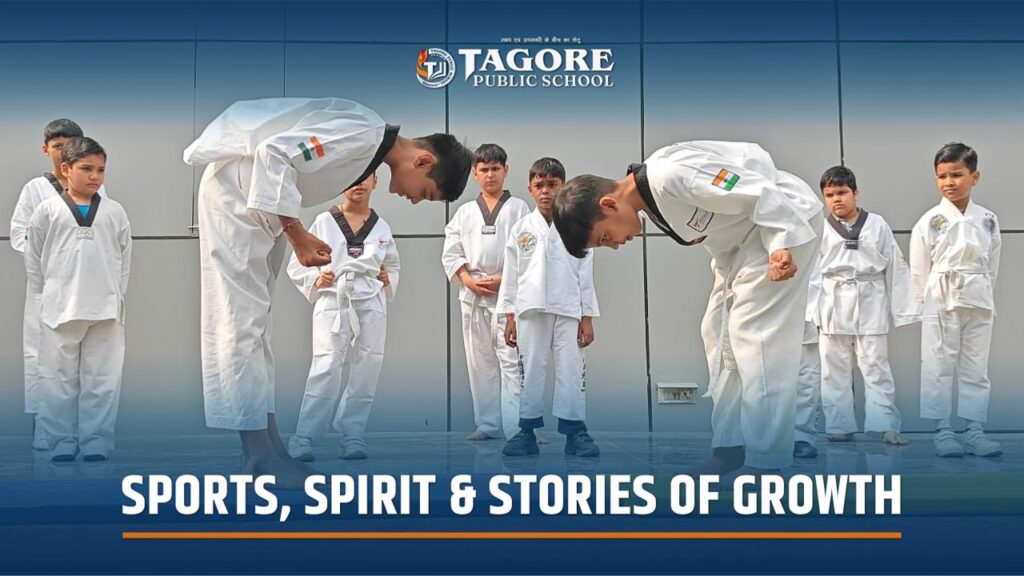
At Tagore Public School, Gurugram (TPSG), education is not confined to classrooms or textbooks. It extends to the playgrounds, stages, and creative spaces where students learn lessons no book can teach. From sports to cultural activities, every experience is designed to shape confident, compassionate, and well-rounded learners. In this blog, let’s explore how sports and activities play an essential role in developing life skills, emotional balance, and leadership qualities in students, making TPSG one of the best schools in Gurgaon for holistic education. Kheloge, Khudoge Banoge Ustad! Sports are the heartbeat of students’ lives at TPSG. They don’t just promote physical health; they teach discipline, teamwork, and resilience. Whether it’s running on the track or scoring a goal, every game becomes a classroom of life lessons. At TPSG, students actively participate in: Kho-Kho:Fast-paced and strategic, Kho-Kho teaches agility, alertness, and teamwork. Players learn how to read the game, trust their team, and make quick decisions. At Tagore, students realise that winning in Kho-Kho is not just about running fast, it’s about thinking smart and playing together. Basketball:A perfect blend of energy and coordination, basketball helps students sharpen focus and communication. Every pass and shot builds not only skill but also confidence to take charge and work as one unit. Skating:Gliding on wheels gives children the thrill of balance and motion. It enhances concentration, coordination, and persistence. At Tagore, skating lessons remind students that progress comes with practice and that even if you fall, the key is to get back up stronger. Taekwondo:This martial art is more than self-defence, it’s self-discipline in motion. Students learn respect, focus, and control as they discover their inner strength with every move. Taekwondo at Tagore instills confidence and courage, empowering students to face challenges with grace and grit. Yoga:In a world that’s always rushing, yoga teaches calm. Through breathing, stretching, and meditation, students develop balance and mental peace. It helps them focus better in class and manage emotions with maturity, a true foundation for both health and mindfulness. Through such experiences, TPSG ensures that every child understands the power of teamwork and the value of fair play. No wonder it stands among the top 5 schools in Gurugram for sports and holistic development. Activities that Inspire Creativity and Confidence While sports build stamina and discipline, co-curricular activities nurture creativity, expression, and imagination. TPSG believes that every child has a unique talent waiting to be discovered, and its rich array of school clubs and programs ensures just that. At TPSG, activities include: Dance and Music: Students express emotions through rhythm and melody, gaining confidence and stage presence. Theatre & Drama: Lights, Camera, Confidence! Whether it’s delivering a powerful monologue or bursting into laughter mid-rehearsal, drama helps students shed shyness and embrace teamwork. Art & Craft: Because Doodles Can Change the WorldSplashing colours, shaping ideas, and letting imagination run wild, art and craft sessions turn classrooms into creative studios. It’s messy, it’s magical, and it reminds students that creativity is never inside the lines! Cultural and Heritage Club: A space for students to explore India’s vibrant traditions and global heritage. Through presentations, research projects, and heritage walks, they develop a sense of pride in their roots while appreciating the beauty of world cultures. Such initiatives make TPSG one of the most dynamic CBSE schools in Gurgaon, where learning is truly experiential and inclusive. Cultural Roots, Global Mindset At Tagore Public School, Gurugram, the Cultural and Heritage Club connects students to their roots while expanding their global vision. Through discussions, creative presentations, and heritage-focused activities, students learn the importance of preserving traditions and respecting diversity. They explore monuments, art, and customs that shape our identity, from India’s timeless heritage to international landmarks that define global civilization. The club also encourages field visits to historical sites, which bring history to life. These experiences nurture empathy, awareness, and appreciation for the world’s cultural richness, shaping young minds to think globally while staying grounded in their Indian values. Character Beyond Academics At Tagore Public School, among the top 5 schools in Gurugram, character education goes hand in hand with learning. Sportsmanship teaches humility in victory and grace in defeat. Cultural activities encourage teamwork, patience, and empathy. Together, these experiences shape students who are confident, respectful, and responsible. Students learn that true success isn’t measured by marks but by mindset. Whether leading a team in a game, coordinating a performance, or volunteering for a cause, they discover that every experience builds resilience and leadership. Final Thoughts In the journey of education, sports and co-curricular activities are not extras; they’re essentials. They teach lessons no textbook can offer: how to win with humility, lose with dignity, and grow through experience. At Tagore Public School, one of the most respected schools in Gurgaon, every child is encouraged to explore, express, and evolve. From the field to the stage, students discover their strengths, passions, and purpose, becoming well-rounded individuals ready to take on the world. Read More Blogs: How Early Leadership Opportunities Shape Confident Students Understanding the School Fees in Gurgaon: What Parents Should Know Confused About Schools in Gurgaon? Here’s the Top 10 You Should Know TPSG’s Three Pillars of Learning – Curiosity, Collaboration, & Excellence
How Early Leadership Opportunities Shape Confident Students
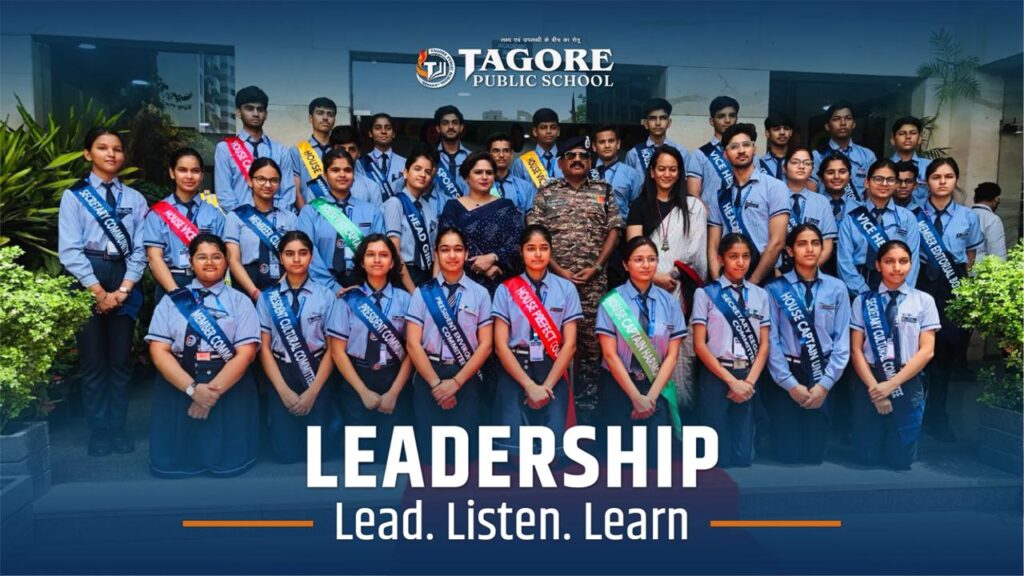
In today’s fast-changing world, leadership is no longer a skill reserved for adults; it’s something children can and should develop from an early age. Whether it’s speaking up in class, organising events, or leading a group project, every small leadership experience builds confidence and character. At Tagore Public School, Gurugram, one of the best schools in Gurgaon, students are encouraged to take initiative and find their unique voice. In this blog, let’s explore how early leadership opportunities shape confidence, responsibility, and a sense of purpose in young learners. Why Leadership Opportunities Matter in School? Leadership is not about holding titles; it’s about building confidence, communication, and teamwork. When students take on leadership roles early in life, they learn essential life skills like problem-solving, empathy, and responsibility. These experiences prepare them to handle challenges inside and outside the classroom. In today’s learning environment, schools that prioritise early leadership programs ensure that students don’t just follow instructions; they learn to make decisions, manage teams, and lead with empathy and courage. How Early Leadership Builds Confidence? Encourages Decision-Making:When students are given responsibility, be it class monitor, club captain, or project leader, they learn to think independently and make thoughtful decisions. Improves Communication:Leading others means learning to listen and express ideas clearly. Students build stronger communication skills that help them in academics and beyond. Boosts Self-Esteem:Leadership experiences help students realise their potential. Every small success, like organising a classroom event, boosts their confidence and self-worth. Leadership in Action at Tagore Public School At Tagore Public School, one of the leading CBSE schools in Gurgaon, leadership is built into the curriculum. From classroom responsibilities to school-wide events, students are empowered to take charge and collaborate effectively. Some of the leadership-building initiatives at TPSG include: Student Council & Class Representatives: Students are elected to represent their peers, voice opinions, and organise school activities, helping them understand democracy and teamwork. Project-Based Learning: Every project encourages students to lead, plan, and present innovative ideas. It’s leadership in practice, not just in theory. Competitions (Debate, Art, STEM, Annual Functions): Leadership also shines during inter-house and inter-school competitions, be it debates, art contests, or STEM-based science practicals. Even annual functions offer students the chance to take charge, plan, and coordinate, learning that teamwork and communication are as important as talent. Listening Skills One of the most underrated yet very important leadership qualities is to listen. As students, learning to genuinely listen to teachers, classmates, and teammates helps them gain knowledge and understand different perspectives. At Tagore Public School, special sessions are conducted to help students realize why listening matters. Through activities, group discussions, and collaborative learning, they find out how attentive listening builds empathy, strengthens teamwork, and nurtures respect among peers. Sports & Cultural Leadership: In sports, too, leadership plays a vital role. For example, in a game of Kho Kho, a leader’s strategy determines the team’s success. Understanding each team member’s strengths and weaknesses helps create unity and confidence, proving that true leaders bring out the best in their teams. Through these opportunities, Tagore Public School ensures that leadership isn’t limited to holding positions; it’s reflected in how students take initiative, support peers, and bring positive change to their school community. Each experience builds lifelong confidence and empathy, preparing them to lead with heart and purpose. How Schools Shape Future Leaders? Schools play a defining role in shaping tomorrow’s leaders. The most effective learning environments encourage students to express their ideas, work together, and develop essential values like empathy, respect, and responsibility. At Tagore Public School, among the top 5 schools in Gurugram, teachers mentor students to step forward, take initiative, and believe in their abilities. Here, leadership is not about competition but about collaboration and learning to make meaningful contributions to the world around them. How Can Parents Encourage Leadership at Home? Parents can reinforce what students learn at school by: Giving them small responsibilities at home, like setting the table or organizing their room, to build accountability. Teaming up with them to complete a task, such as cleaning their room, and letting them divide roles to understand teamwork. Helping them learn time management by creating daily schedules or balancing studies with playtime. Allowing them to make small decisions and learn from the outcomes to boost independence. Appreciating their effort over perfection to build resilience and confidence. When parents and teachers work together, children naturally develop into capable, confident leaders ready to take initiative and lead with empathy. The Future Belongs to Young Leaders Across the country, schools are realizing that leadership programs aren’t optional; they’re essential for preparing confident, compassionate changemakers. At Tagore Public School, one of the most respected names in the list of schools in Gurgaon, leadership is a mindset built through daily learning, teamwork, and self-discovery. By nurturing empathy, creativity, and initiative, the school empowers students to lead with purpose and shape a brighter tomorrow. Final Thoughts Early leadership opportunities teach students to believe in themselves and value teamwork. They learn that leadership is not about power, it’s about purpose. With a balanced approach to academics and emotional development, schools like Tagore Public School, Gurugram, one of the best CBSE schools in Gurgaon, are shaping students who don’t just dream of a better future; they lead it. At TPSG, every initiative, project, and idea nurtures confident young leaders ready to make a difference, proving that true leadership begins with learning, empathy, and action. Read More Blogs: Understanding the School Fees in Gurgaon: What Parents Should Know Admission Guide 2026: School Application Process in Gurgaon Confused About Schools in Gurgaon? Here’s the Top 10 You Should Know TPSG’s Three Pillars of Learning – Curiosity, Collaboration, & Excellence
Understanding the School Fees in Gurgaon: What Parents Should Know

When it comes to choosing the right school for your child, understanding the fee structure is just as important as evaluating the curriculum, facilities, or reputation. Gurgaon, being one of the fastest-growing educational hubs, offers a wide range of schools from premium international institutions to reputed CBSE schools in Gurgaon, each with its own fee system and offerings. In this blog, we’ll help you understand what goes into a school’s fee structure, how to evaluate it wisely, and how schools like Tagore Public School, Gurugram, maintain transparency while providing quality education. Understanding What School Fees Include When parents begin exploring schools in Gurgaon, one of the first questions that arises is, What exactly does the school fee cover? Understanding this breakdown helps you plan better and avoid last-minute surprises. Most schools divide their fees into a few main categories: Registration and Admission Fee: A one-time amount paid during admission. This typically covers the processing, verification, and initial setup costs. Tuition Fee: This is the recurring monthly or quarterly charge that covers teaching, classroom learning, and academic activities. Annual Charges: These are meant to maintain school facilities, libraries, laboratories, and digital resources. Development or Infrastructure Fee: Some schools levy this to upgrade facilities like smart classrooms, sports grounds, or technology labs. Transport Fee: Optional, depending on whether your child uses school bus services. Activity and Examination Fees: Cover co-curricular programs, competitions, and exam-related expenses. At Tagore Public School, Gurugram, transparency is key. Every fee component is clearly listed on their official website, ensuring that parents know exactly what they are paying for. Factors Influencing School Fees in Gurgaon The fee structure of the best schools in Gurgaon varies depending on several important factors. Understanding these can help parents choose wisely based on priorities and budget: Curriculum Type: CBSE, IB, and Cambridge (IGCSE) schools differ in approach and resources. CBSE schools like Tagore Public School often offer quality education at more accessible costs while maintaining high academic standards. Infrastructure & Facilities: Schools with smart classrooms, labs, and sports facilities tend to have higher maintenance costs. Teacher Expertise & Student Ratio: Institutions that invest in highly trained educators and maintain small student-teacher ratios may charge slightly more but this ensures individual attention and quality learning. Co-Curricular Opportunities: Extracurriculars like theatre, art, dance, and more add value to holistic learning but also influence cost. Location: Schools located in central or high-demand areas of Gurgaon tend to have slightly higher operational expenses. Tagore Public School maintains a thoughtful balance, providing modern amenities, project-based learning, and co-curricular excellence at affordable fees, making it one of the top 5 schools in Gurugram for holistic development. A Closer Look at Tagore Public School’s Fee Structure As one of the top 5 schools in Gurugram, Tagore Public School follows a fair and transparent approach to its fee policy. Parents can access the complete structure on the official website. Here’s what you can typically expect at TPSG: Registration Fee: A small amount paid during application submission to initiate the admission process. Admission Fee: A one-time, non-refundable payment at the time of enrollment. Tuition Fee: Covers academic instruction, project-based learning, assessments, and classroom experiences. Transport Fee: Optional and based on the student’s route and distance from the school. Tagore Public School’s approach ensures there are no hidden costs; parents are informed of all expenses upfront. The school also offers flexible payment schedules to ease the process for families. Comparing Fee Ranges Across Gurgaon Schools Parents exploring the list of best schools in Gurgaon often find significant variations in fee structures. International curriculum schools generally charge higher fees due to global faculty and resources, while CBSE schools like Tagore Public School provide high-quality education at more accessible rates. Tagore’s approach focuses on affordability without compromising on learning outcomes, making it an ideal choice for parents seeking both value and quality. Why is Tagore Public School Worth the Investment? Education at Tagore is not just about textbooks; it’s about nurturing life skills, curiosity, and character. Here’s what makes the investment worthwhile: Holistic Development: Project-based learning, leadership programs, and personality development initiatives. Value-Based Education: Instilling ethics, empathy, and responsibility in students. Advanced Facilities: Air-conditioned classrooms, CCTV security, transport facilities, and digital labs. Extracurricular Excellence: From art, music, and theatre to robotics, yoga, and sports. Global Outlook: Integration of Sustainable Development Goals (SDGs) in learning to build global citizens. Tagore’s blend of affordability, academic strength, and holistic development makes it one of the best CBSE schools in Gurgaon. How to Plan Your Child’s School Budget? Before finalising a school, parents should: Compare tuition and additional costs. Check payment frequency (monthly/quarterly). Ask about scholarships or sibling discounts (if available). Review the facilities offered in return for the fee. Ensure fee transparency, no hidden costs. Tagore Public School’s open communication policy ensures parents know exactly where their money goes towards meaningful education and student well-being. Final Thoughts Choosing the right school is one of the most important financial and emotional investments for parents. Understanding the fee structure helps ensure you make a decision that aligns with your budget and expectations. In a city filled with excellent schools in Gurgaon, Tagore Public School stands out for offering world-class learning at accessible costs, proving that quality education doesn’t have to come with an overwhelming price tag. “Value in every lesson, promise in every fee.” Read More Blogs: What Makes a Modern School Truly ‘Global’? Admission Guide 2026: School Application Process in Gurgaon Confused About Schools in Gurgaon? Here’s the Top 10 You Should Know TPSG’s Three Pillars of Learning – Curiosity, Collaboration, & Excellence




